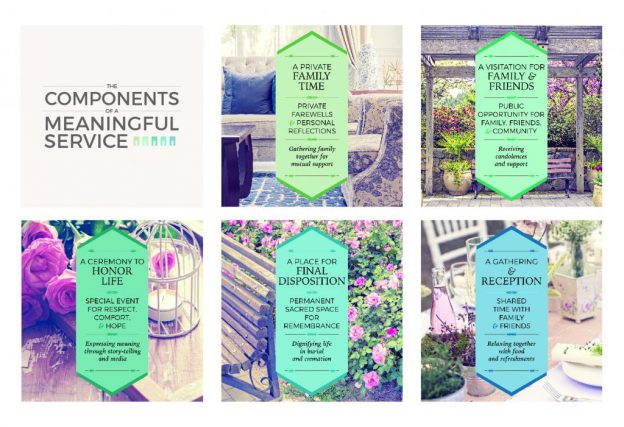The 6 Cornerstones of Funeral Service That Guide Everything
Originally Posted on the funeralOne Blog
The goal of a funeral director should not be to increase call volume, revenue per call, or to get as many families as possible through their doors each year. No… the ultimate goal of any funeral professional should be to provide nurturing care to the families that they serve through the essential cornerstones of the funeral process. (The benefit of doing so just happens to be that call volume will increase and revenue will soar as a byproduct… it’s truly a win-win for everyone.)
But what exactly are the cornerstones that funeral service was built upon? Which expectations, above all others, should your funeral home be aiming to exceed when you sit down with a new family? We decided to find out for ourselves at this past NFDA, when we sat in for a session called Why Funeral Directors Must Become Ritual Specialists with Jason Troyer, Ph.D. and Lynn Gibson, D.Phil., CFSP.
Throughout the session, Troyer and Gibson spoke about how everything funeral professionals do should be judged against six primary cornerstones… from their products, to their services, and even the way that they help families. Is what you are doing as a funeral professional helping to facilitate the cornerstones of funeral ritual? Or are you taking yourself (and your families) away from them? To know fully, you must first understand the ins and outs of the primary cornerstones of funeral service.
The 6 Cornerstones of Funeral Ritual and Bereavement Care
Each of the following cornerstones are an essential aspect of funeral care, but none of them are more important than another. (For example, there is no presumed hierarchy, stages or phases that your families must experience when going through the funeral ritual process.) Each element is universally beneficial to every person who walks through your door, and each has their own unique advantages and challenges. The cornerstones include…
1. Dignity – Putting focus on caring for the deceased and the bereaved. In this cornerstone, it’s about putting all of your energy into how you can best serve your families. Care and compassion are most important. You want to ensure that you are treating the deceased with respect, and empathizing with other bereaved individuals.
2. Acceptance – Helping others to recognize the finality of death. Focus on funeral services and models of grief that affirm the importance of accepting that a death has occurred. Encouraging families to view the deceased is often helpful, but not always required. Accompanying the deceased to final disposition is also helpful, but not always required.
3. Ritual – Placing emphasis on participating in symbolic action. Setting up rituals gives your families an opportunity to put their feelings and thoughts into action. Provide structure during uncertain and difficult times, as it will allow families to connect their grief to religious, spiritual or cultural traditions.
4. Meaning – Focusing on helping families seek hope and understanding, so that they can begin to make sense of their loss. Slowly help them reorganize and reframe their worldview and incorporate their new reality into their daily life. They may need guidance through topics such as why things happen, what happens after death, religious/spiritual views, etc.
5. Support – Putting emphasis on receiving and providing support, whether that’s in large or small groups, in person, or virtually through your funeral home website. These families want to receive caring expressions (messages, cards, flowers, gifts, stories, etc.) during and after their funeral rituals.
To learn more about how you can support families online with digital grief counseling and sympathy gifts right on your funeral home website, click here to talk to one of our funeral website specialists.
6. Legacy – Encouraging families to share stories and remember their loved ones. Don’t hesitate to encourage activities that surround the value and importance of sacred spaces. Help families recognize the ongoing relationship that they have with the deceased (including putting a focus on continuing their bond) and encourage them to pass down legacies.
Supporting Funeral Cornerstones With Relevant Components
Now that you know about the important cornerstones of a funeral service you should focus on when serving your families, it’s time to learn about the service elements, or what Troyer refers to as “components,” that will help you support these cornerstones. After all, while the hierarchy of these cornerstones may not be vital, what is important is that they are chosen and presented based on the unique circumstances of the loss.
Let’s take a step back… every service that your funeral home offers was originally created as means for serving a cornerstones of funeral service. For example, for families focused on the legacy aspect of funerals, such as remembering their loved one or sharing meaningful memories, social receptions and gatherings were created.
But not all components are necessary for every single funeral service. Instead, you should design your services around the components that will best serve your family, based on the cornerstones that they value the most.
Components also do not have to be represented in the same fashion from family to family. They can be as traditional or non-traditional as needed, and as elaborate or simple as the family requests. It’s up to you, as a funeral director, to facilitate these components in a way that will provide the most support and value to your families.
Typically, the components that funeral homes offer families fall into five major categories:
1. Private Family Time – Private farewells and personal reflections are great for families who want to share private moments with their family, and are interested in gathering family together for mutual support.
2. Visitations for Family and Friends – Open visitations offer public opportunities for family, friends and community to come together to offer condolences and give support.
3. A Ceremony to Honor Life – The ideal event for families who are looking for a special, unique way to honor their loved one through storytelling and media, while getting comfort and hope from family and friends.
4. A Place for Final Disposition – For those looking for a more permanent remembrance space for their loved one, permanent sacred spaces, such as burial and cremation spaces, can offer a great comfort.
5. A Gathering and Reception – Celebration of life events, such as receptions that offer shared time with family and friends, offer a great opportunity to relax together with food and refreshments, while sharing important memories and reflections of a life well lived.

So now that you know about the different components that help support the cornerstones of funeral service, how do you know which is the best value for the families that you’re serving? Ask… but in a way that opens up the door for different opportunities and options for your families.
For example, asking dead-end questions such as, “Would you like to have a service?” sets your families up for an all or nothing answer – especially if they do not know about all of the options that are available to them. However, if you offer up a variety of more specific, manageable questions, you can get a better idea of what wishes your families have.
The following questions give you multiple opportunities for “yes,” all without not taking anything away from traditional families:
- – Would you like a private viewing?
- – Would you like a visitation?
- – Would you like a ceremony?
- – Would you like a final disposition service?
- – Would you like a reception?
- – Would you like cremation or burial?
Asking the questions above will help you identify which cornerstones are most important to your families, and which components will best facilitate those cornerstones. You can also walk them through the components of a meaningful service, and outline the advantages and disadvantages of each, so that they have a more complete picture of what service options are available to them… thereby giving them a better overall funeral experience.




